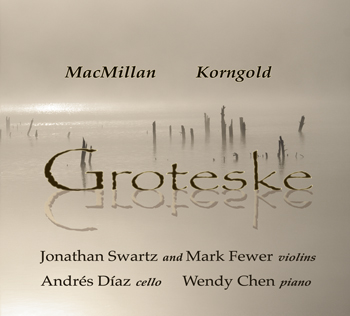A new CD of chamber music featuring busy Canadian violinists Mark Fewer and native Torontonian Jonathan Swartz contains a pretty compelling mix of new and obscure.
The new is Fantasy Variations on a Theme by Charpentier, which allows Toronto composer, teacher and director Kieran MacMillan to show off what a clever boots he is. The theme, borrowed from a Ritournelle from Marc-Antoine Charpentier's nativity cantata, is laid out in a way so simple as to sound primitive, but MacMillan quickly turns it into a freewheeling set of 11 variations that cover just about every art music style imaginable.
The obscure is the five-movement Suite, Op. 23, for two violins, cello and left-handed piano commissioned by left-handed pianist Paul Wittgenstein from Erich Wolfgang Korngold "" completed in 1930. (The album's title comes from the middle movement, "Groteske".) It is a remarkable showcase of a very creative composer. Korngold managed to somehow fuse the new aesthetic of the 20th century with late Romanticism. Sometimes it sounds as if he's trying to underpin serial tone rows with traditional harmonies. it's a fascinating interplay.
This excellent quartet of players delivers all the music on this disc with zest, flawless technique and a lot of care in the shaping of the music. Pianist Wendy Chen engages with the piano with red-blooded gusto.
It may seem like a risk to take a chance on this disc, but it's well worth it.
John Terauds, Musical Toronto
Erich von Korngold's Suite, Op. 23 (1928) is a remarkable though lesser-known work, commissioned by one-armed pianist Paul Wittgenstein and ably performed here by Jonathan Swartz and Mark Fewer, violins, Andrés Díaz, cello, and Wendy Chen, piano. The viola's absence de-clutters the middle register, letting Korngold's left-hand piano writing shine. At the Prelude and Fugue's opening flourish the piano announces its full and equal participation, delivered here with superb virtuosity by Wendy Chen. Violinists Fewer and Swartz capture the disoriented giddiness of the Waltz while cellist Díaz leads similarly into the almost hallucinatory Groteske, which carries us through turbulent mood contrasts. The intense, post-Mahler Lied followed by the ingenious, energetic variations of the Rondo-Finale complete this exciting performance.
In Toronto-based Kieran MacMillan's Fantasy Variations on a Theme by Charpentier, commissioned by Swartz for the same instruments, fantasy is the key element. The work weaves in and out stylistically from its theme, taken from a Marc-Antoine Charpentier cantata. I enjoyed the atonal flights in the evanescent Variation 3 and Messiaen-like piano flourishes in Variation 6. The tonal variations are evocative too, some tending to magic realism in suggesting glimpses of the past or the beyond. Mixing styles has been accepted since the 1960s when Foss, Rochberg, Colgrass, Kagel and others started quoting, re-working, or re-creating in the styles of earlier composers. And through being tasteful, aptly conceived for the instrumentation, and welcoming to the listener, these fantasy-variations are worth hearing too.
Roger Knox, Wholenote
Groteske hardly describes this album as a whole, but it is the name of the scherzo, the middle and longest movement in Korngold's Suite, Op. 23, for two violins, cello, and piano (left hand), that is the strangest and most musically fascinating track on the CD. Korngoldwrote the quartet for Paul Wittgenstein, the pianist who lost his right arm in the First World War and was responsible for commissioning a raft of exceptional compositions for the left hand. The scherzo recalls the fast movement of the Debussy String Quartet in its obsessive, manic gyrations, and its slow middle section is also pretty creepy; it's a real tour de force. The remaining movements of the Korngold may not be grotesque, but they are highly attractive examples of the composer's best work: forward-looking but sumptuously lyrical, full of saturated harmonies, and frequently rhapsodic. The fourth movement, "Lied," based on one of the composer's early songs, is especially gorgeous. Canadian composer Kieren MacMillan (born 1969) wrote his Fantasy Variations on a Theme by Charpentier for the performers who play it here, violinists Jonathan Swartz and Mark Fewer, Andrés Díaz, and pianist Wendy Chen. It's an appealing, mostly gentle work based on a very lovely Ritornello by the Baroque French composer. MacMillan's inventive variations are largely tonal, and some of them can be stylistically linked to the works of other composers. The performers play both works with polish, spirit, and obvious affection. There are some chair creaks, but otherwise the sound is clear, present, and well-balanced.
Stephen Eddins, allmusic
The new is Fantasy Variations on a Theme by Charpentier, which allows Toronto composer, teacher and director Kieran MacMillan to show off what a clever boots he is. The theme, borrowed from a Ritournelle from Marc-Antoine Charpentier's nativity cantata, is laid out in a way so simple as to sound primitive, but MacMillan quickly turns it into a freewheeling set of 11 variations that cover just about every art music style imaginable.
The obscure is the five-movement Suite, Op. 23, for two violins, cello and left-handed piano commissioned by left-handed pianist Paul Wittgenstein from Erich Wolfgang Korngold "" completed in 1930. (The album's title comes from the middle movement, "Groteske".) It is a remarkable showcase of a very creative composer. Korngold managed to somehow fuse the new aesthetic of the 20th century with late Romanticism. Sometimes it sounds as if he's trying to underpin serial tone rows with traditional harmonies. it's a fascinating interplay.
This excellent quartet of players delivers all the music on this disc with zest, flawless technique and a lot of care in the shaping of the music. Pianist Wendy Chen engages with the piano with red-blooded gusto.
It may seem like a risk to take a chance on this disc, but it's well worth it.
John Terauds, Musical Toronto
Erich von Korngold's Suite, Op. 23 (1928) is a remarkable though lesser-known work, commissioned by one-armed pianist Paul Wittgenstein and ably performed here by Jonathan Swartz and Mark Fewer, violins, Andrés Díaz, cello, and Wendy Chen, piano. The viola's absence de-clutters the middle register, letting Korngold's left-hand piano writing shine. At the Prelude and Fugue's opening flourish the piano announces its full and equal participation, delivered here with superb virtuosity by Wendy Chen. Violinists Fewer and Swartz capture the disoriented giddiness of the Waltz while cellist Díaz leads similarly into the almost hallucinatory Groteske, which carries us through turbulent mood contrasts. The intense, post-Mahler Lied followed by the ingenious, energetic variations of the Rondo-Finale complete this exciting performance.
In Toronto-based Kieran MacMillan's Fantasy Variations on a Theme by Charpentier, commissioned by Swartz for the same instruments, fantasy is the key element. The work weaves in and out stylistically from its theme, taken from a Marc-Antoine Charpentier cantata. I enjoyed the atonal flights in the evanescent Variation 3 and Messiaen-like piano flourishes in Variation 6. The tonal variations are evocative too, some tending to magic realism in suggesting glimpses of the past or the beyond. Mixing styles has been accepted since the 1960s when Foss, Rochberg, Colgrass, Kagel and others started quoting, re-working, or re-creating in the styles of earlier composers. And through being tasteful, aptly conceived for the instrumentation, and welcoming to the listener, these fantasy-variations are worth hearing too.
Roger Knox, Wholenote
Groteske hardly describes this album as a whole, but it is the name of the scherzo, the middle and longest movement in Korngold's Suite, Op. 23, for two violins, cello, and piano (left hand), that is the strangest and most musically fascinating track on the CD. Korngoldwrote the quartet for Paul Wittgenstein, the pianist who lost his right arm in the First World War and was responsible for commissioning a raft of exceptional compositions for the left hand. The scherzo recalls the fast movement of the Debussy String Quartet in its obsessive, manic gyrations, and its slow middle section is also pretty creepy; it's a real tour de force. The remaining movements of the Korngold may not be grotesque, but they are highly attractive examples of the composer's best work: forward-looking but sumptuously lyrical, full of saturated harmonies, and frequently rhapsodic. The fourth movement, "Lied," based on one of the composer's early songs, is especially gorgeous. Canadian composer Kieren MacMillan (born 1969) wrote his Fantasy Variations on a Theme by Charpentier for the performers who play it here, violinists Jonathan Swartz and Mark Fewer, Andrés Díaz, and pianist Wendy Chen. It's an appealing, mostly gentle work based on a very lovely Ritornello by the Baroque French composer. MacMillan's inventive variations are largely tonal, and some of them can be stylistically linked to the works of other composers. The performers play both works with polish, spirit, and obvious affection. There are some chair creaks, but otherwise the sound is clear, present, and well-balanced.
Stephen Eddins, allmusic




